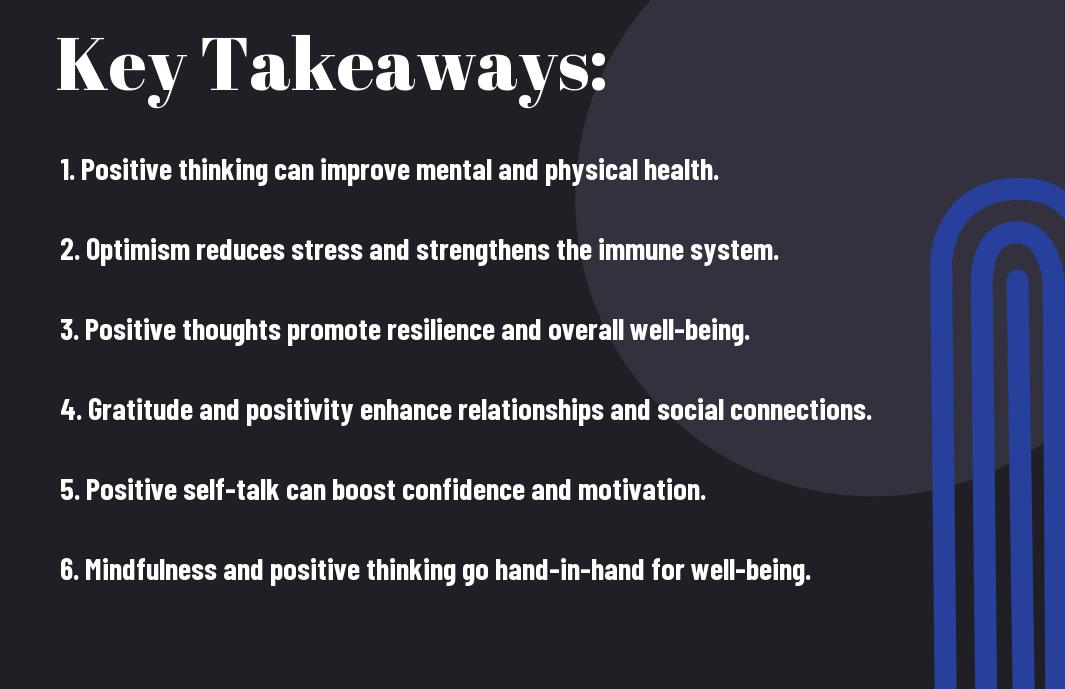Over the years, research has shown that positive thinking can have a profound impact on our mental and physical well-being. By fostering a positive mindset, individuals can experience lower levels of stress, reduced risk of depression, improved immune function, and even enhanced cardiovascular health. This blog post will explore the science behind positive thinking and how it can benefit our overall health and well-being.
This post contains Amazon affiliate links, meaning I may earn a small commission if you purchase through my links, at no extra cost to you. Note: We aim to provide accurate product links, but some may occasionally expire or become unavailable. If this happens, please search directly on Amazon for the product or a suitable alternative.
Key Takeaways:
- Positive thinking can improve mental well-being: Cultivating a positive mindset can reduce symptoms of anxiety and depression, leading to better emotional health.
- Positive thinking can enhance physical health: Research suggests that positive thinking can boost the immune system, lower blood pressure, and reduce the risk of cardiovascular disease.
- Optimism leads to resilience: People who practice positive thinking are more likely to bounce back from setbacks and cope effectively with stress.
- Positive thinking fosters better relationships: Optimistic individuals tend to be more approachable, supportive, and have stronger social connections due to their positive outlook on life.
- Gratitude and mindfulness play a key role: Incorporating gratitude practices and mindfulness techniques can help reinforce positive thinking patterns and promote overall well-being.

The Psychology Behind Positive Thinking
Any Positive Thinking: Benefits and How to Practice can significantly impact an individual’s mental and physical well-being. Understanding the psychology behind positive thinking can shed light on its powerful effects on overall health.
Cognitive Impact of Positivity
With a positive mindset, individuals tend to have more clarity in their thinking and are better able to problem-solve. This is because optimism promotes creativity and flexible thinking, allowing individuals to approach challenges with a solutions-oriented mindset. Positive thinking has also been linked to improved cognitive function and memory retention, making it easier to learn and retain new information.
Emotional Benefits of an Optimistic Outlook
One of the key emotional benefits of maintaining an optimistic outlook is a reduction in stress and anxiety. Optimism helps individuals develop resilience in the face of adversity, allowing them to bounce back from setbacks more easily. It also fosters emotional intelligence and empathy, improving relationships and social connections.
It’s important to note that individuals who practice positive thinking are more likely to experience increased happiness and life satisfaction. By focusing on the positive aspects of life, they cultivate a positive mindset that can lead to greater overall well-being and improved quality of life.
Physical Health Benefits of Positive Thinking
Immune System Enhancement
Not only does positive thinking have a profound impact on our mental well-being, but it also plays a critical role in boosting our physical health. Research has shown that individuals who maintain a positive outlook on life tend to have a stronger immune system. This means they are better equipped to fight off illnesses and infections, leading to fewer sick days and overall improved health.
Positive emotions trigger the release of endorphins in the body, which are known to reduce stress and inflammation. When we are less stressed and our bodies are experiencing less inflammation, our immune system can function more efficiently. This highlights the powerful connection between our mind and body, and the impact that positive thinking can have on our overall well-being.
Cardiovascular Health and Longevity
Physical health benefits of positive thinking extend beyond the immune system to cardiovascular health and longevity. Research has indicated that individuals with a positive outlook on life tend to have lower blood pressure, reduced risk of heart disease, and overall better cardiovascular health. This can lead to a longer and healthier life.
Positive thinking is associated with healthier lifestyle choices, such as regular exercise, balanced diet, and avoidance of harmful habits like smoking and excessive drinking. These behaviors contribute to improved cardiovascular health and can significantly impact our overall longevity and quality of life.
Benefits: Maintaining a positive outlook on life not only enhances our mental well-being, but it also strengthens our immune system, improves cardiovascular health, and ultimately contributes to a longer and healthier life. It is essential to prioritize positivity in our daily lives to reap these remarkable benefits for our physical health.
Strategies for Cultivating a Positive Mindset
For individuals seeking to cultivate a positive mindset, there are several effective strategies that can be implemented to promote mental and physical well-being. These strategies focus on shifting perspectives, fostering optimism, and enhancing overall happiness. By incorporating these techniques into daily routines, individuals can experience improved quality of life and greater resilience in the face of challenges.
Mindfulness and Meditation
Positive thinking can be nurtured through practices such as mindfulness and meditation. Mindfulness involves paying attention to the present moment without judgment, which can help individuals gain a deeper understanding of their thoughts and emotions. Meditation, on the other hand, allows individuals to cultivate inner peace and clarity by focusing on the present moment and letting go of negative thoughts.
Meditation has been shown to reduce stress levels, improve concentration, and promote a sense of calmness and well-being. By incorporating regular meditation practices into daily routines, individuals can train their minds to focus on the positive aspects of life and develop a more optimistic outlook.
Establishing Positive Habits
Mindfulness and meditation are powerful tools for cultivating a positive mindset, but it is equally important to establish positive habits that support mental and physical well-being. This can include engaging in regular exercise, maintaining a healthy diet, getting an adequate amount of sleep, and practicing gratitude. These habits not only contribute to overall health and well-being, but also contribute to a more positive mindset by reinforcing positive behaviors and mindsets.
Challenges and Considerations
Managing Realistic Expectations
To effectively practice positive thinking, it is crucial to manage realistic expectations. Any individual engaging in positive thinking should understand that positivity does not equate to a life free of challenges or setbacks. It is essential to acknowledge that obstacles will still arise, and it is normal to experience negative emotions in response to them.
Setting realistic expectations means recognizing that positive thinking is not a cure-all solution. Any individual on a journey to enhance their mental and physical well-being through positive thinking should be prepared to face difficulties and setbacks. Having a balanced perspective on the ups and downs of life can help individuals navigate challenges with resilience and optimism.
The Balance Between Positivity and Realism
On the path to positive thinking, it is crucial to strike a delicate balance between positivity and realism. On one hand, maintaining a positive mindset can significantly improve overall well-being by reducing stress and enhancing resilience. However, it is important not to overlook the importance of being realistic about situations and potential outcomes.
Considerations should be made to avoid falling into the trap of toxic positivity, where individuals dismiss or invalidate genuine negative emotions. Any individual striving for a healthy balance between positivity and realism must learn to acknowledge their feelings while also actively seeking solutions and maintaining an optimistic outlook.
Summing up
Drawing together the various studies and research discussed, it is clear that the science of positive thinking plays a significant role in boosting both mental and physical well-being. By focusing on the power of optimism, gratitude, and mindfulness, individuals can improve their overall health and quality of life. The proven benefits of positive thinking, such as reduced stress, enhanced immune function, and better cardiovascular health, highlight the importance of incorporating these practices into our daily lives. Overall, embracing a positive mindset can lead to a happier and healthier life.
FAQ
Q: What is positive thinking?
A: Positive thinking is the practice of focusing on the good in any given situation and expecting positive outcomes. It involves shifting your mindset to see the silver lining in challenges and approaching life with a hopeful and optimistic outlook.
Q: How does positive thinking boost mental well-being?
A: Positive thinking can improve mental well-being by reducing stress, anxiety, and depression. When you think positively, you are more likely to cope with challenges effectively, build resilience, and experience greater happiness and satisfaction in life.
Q: How does positive thinking boost physical well-being?
A: Positive thinking can have a direct impact on physical well-being by boosting the immune system, reducing the risk of cardiovascular diseases, and improving overall health outcomes. It also promotes healthier lifestyle choices, such as regular exercise and balanced nutrition.
Q: Can anyone learn to think more positively?
A: Yes, anyone can learn to cultivate a more positive mindset through practice and persistence. By incorporating techniques such as mindfulness, gratitude journaling, and cognitive restructuring, individuals can train their brains to default to positive thinking patterns.
Q: What are some practical tips for incorporating positive thinking into daily life?
A: Some practical tips for incorporating positive thinking into daily life include surrounding yourself with positive influences, practicing self-care and relaxation techniques, challenging negative thoughts, setting realistic goals, and reminding yourself of past successes and achievements.









